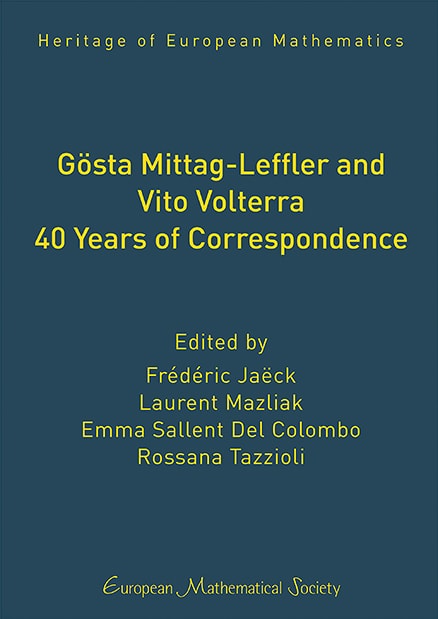Gösta Mittag-Leffler and Vito Volterra. 40 Years of Correspondence
Editors
Frédéric Jaëck
Ecole Normale Supérieure, Paris, FranceLaurent Mazliak
Université Pierre et Marie Curie, Paris, FranceEmma Sallent Del Colombo
Universitat de Barcelona, SpainRossana Tazzioli
Université Lille 1, Villeneuve-d'Ascq, France

A subscription is required to access this book.
The present book contains the voluminous correspondence exchanged between the Swedish mathematician Gösta Mittag-Leffler and his younger Italian colleague Vito Volterra spanning a period of almost forty years at the end of the 19th and beginning of the 20th centuries. The relationship between the two men is remarkable for both personal and scientific reasons. Mittag-Leffler met Volterra for the first time as a brilliant young student of Ulisse Dini in Pisa. He was soon captivated by the creativity and the skills of the young man, and eventually became his mentor. Being himself at the center of a major scientific network, Mittag-Leffler introduced Volterra to the major mathematicians of the time, especially the Germans (Weierstrass, Klein, Cantor…) and French (Darboux, Jordan…). In a few years, Volterra became the most prominent Italian mathematician and forged his own network of scientists all over Europe, and even in the United States which he was one of the first major European mathematicians to visit. Despite their difference in age, both men developed a deep and faithful friendship and their letters reflect the variety of themes of their exchanges. Of course, mathematics was the most prominent, and both men often used the letters as a first draft of their ideas and the addressee as a first judge of their soundness. Besides mathematics, they also touched upon many aspects of both private and public life: matrimony, children, holidays, politics and so on. This vast set of letters affords the reader a general overview of mathematical life at the turn of the 19th century and an appreciation of the European intellectual spirit which came to an end, or at least suffered a drastic turn, when the Great War broke out. Volterra and Mittag-Leffler’s exchanges illustrate how general analysis, especially functional analysis, gained a dramatic momentum during those years, and how Volterra became one of the major leaders of the topic, opening the path for several fundamental developments over the following decades. Through the letters one can follow the institutional career and scientific activity of both Volterra and Mittag-Leffler who shared many details about their situation.
The four editors are all specialists in the history of mathematics of the considered period. An extensive general introduction to the correspondence explains the context and the conditions in which it was developed. Moreover, the original letters are annotated with a large number of footnotes, which provide a broader cultural picture from these captivating documents.